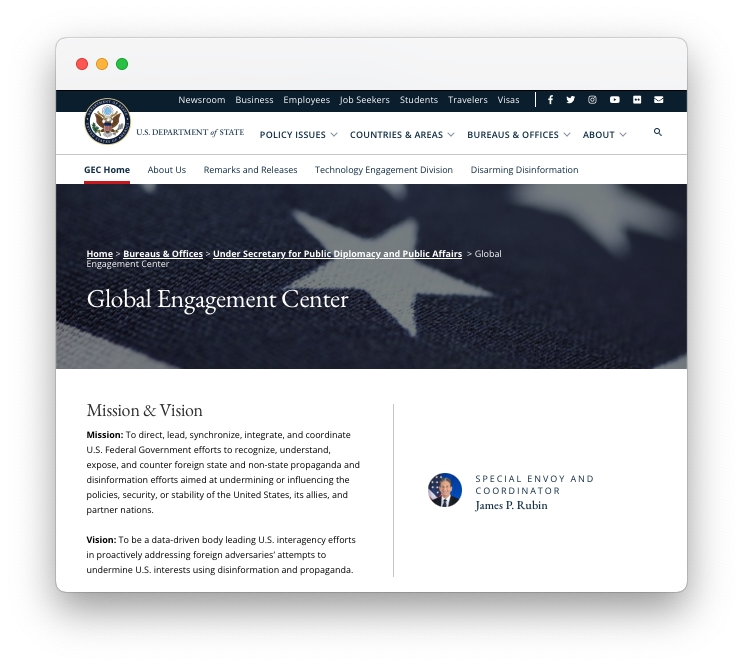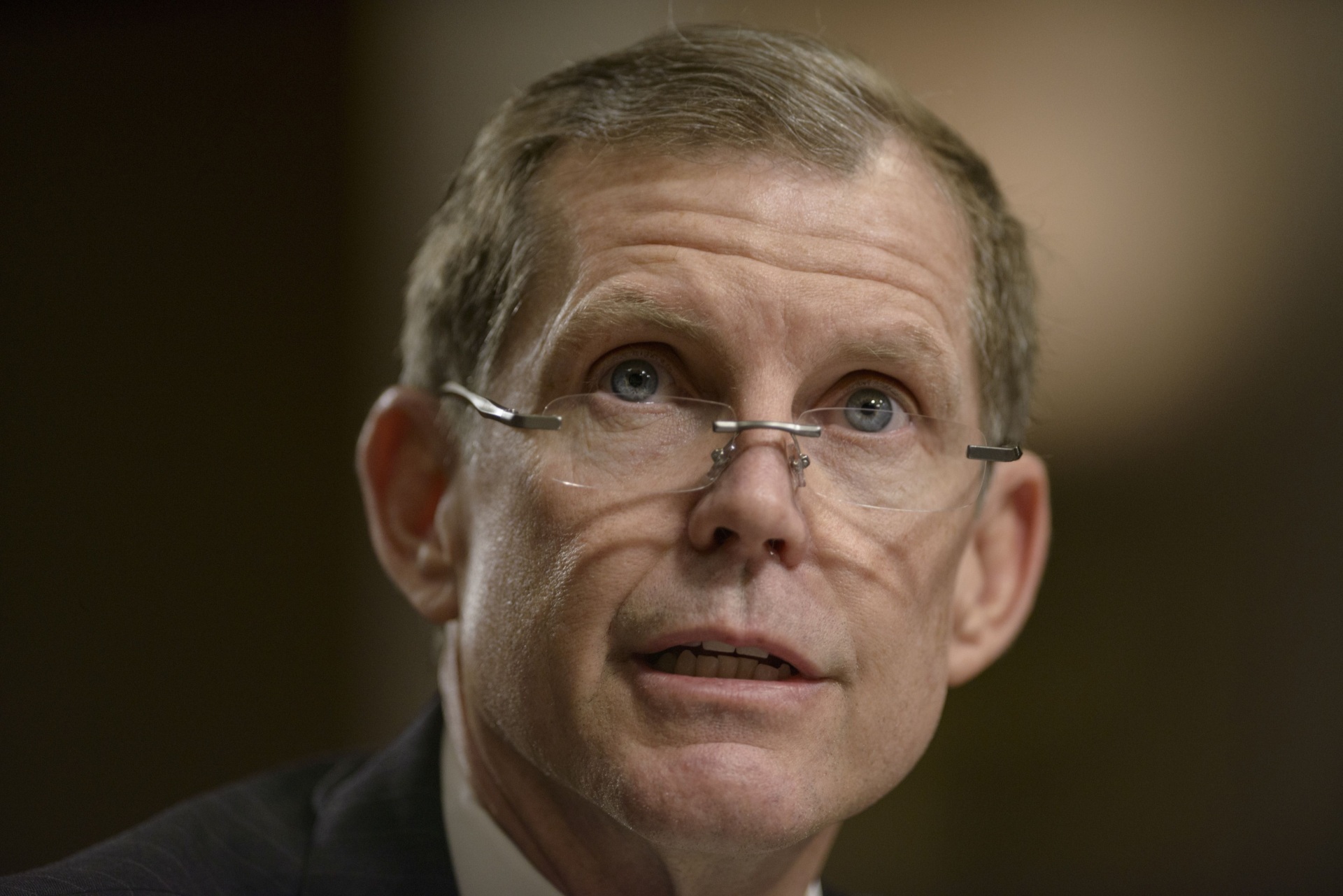 Parler
Parler Gab
Gab
To direct, lead, synchronize, integrate, and coordinate U.S. Federal Government efforts to recognize, understand, expose, and counter foreign state and non-state propaganda and disinformation efforts aimed at undermining or influencing the policies, security, or stability of the United States, its allies, and partner nations.By themselves, those words emphasizing foreign disinfo might sound okay. However, the GEC takes the broadest possible view of its mission to include domestic targets — meaning U.S. citizens. Siegel quotes the first head of the GEC, Michael D. Lumpkin, criticizing laws that protect the rights of Americans, such as the Privacy Act of 1974. As Lumpkin put it, “The 1974 act was created to make sure that we aren’t collecting data on U.S. citizens. Well, … by definition the World Wide Web is worldwide.” In other words, we’re all legitimate targets for Lumpkin’s agency.
 Siegel explains: “The message from the U.S. defense establishment was clear: To win the information war—an existential conflict taking place in the borderless dimensions of cyberspace—the government needed to dispense with outdated legal distinctions between foreign terrorists and American citizens.” Once again, fighting terror is a legitimate and important goal. But here’s where we have to put a high degree of trust in our guardians; and to be trusted, the guardians need to be trustworthy.
Siegel explains: “The message from the U.S. defense establishment was clear: To win the information war—an existential conflict taking place in the borderless dimensions of cyberspace—the government needed to dispense with outdated legal distinctions between foreign terrorists and American citizens.” Once again, fighting terror is a legitimate and important goal. But here’s where we have to put a high degree of trust in our guardians; and to be trusted, the guardians need to be trustworthy.
 Of course, the would-be guardians have their ready answer: You can trust us. After all, they are the experts and they’re diverse — at least as they like to measure “diversity.” “To counter propaganda and disinformation,” the GEC stated in 2018, “will require leveraging expertise from across government, tech and marketing sectors, academia, and NGOs.” In other words, the progressive gang’s all here. Isn’t that diverse enough?
Big tech certainly answered the censor’s call. In 2017, Google — always “The Good Censor” — launched Project Owl whose mission, the New York Times explained, was “to stamp out fake news stories from its search results.”
Of course, the would-be guardians have their ready answer: You can trust us. After all, they are the experts and they’re diverse — at least as they like to measure “diversity.” “To counter propaganda and disinformation,” the GEC stated in 2018, “will require leveraging expertise from across government, tech and marketing sectors, academia, and NGOs.” In other words, the progressive gang’s all here. Isn’t that diverse enough?
Big tech certainly answered the censor’s call. In 2017, Google — always “The Good Censor” — launched Project Owl whose mission, the New York Times explained, was “to stamp out fake news stories from its search results.”
 Since then, the technique of labelling inconvenient information as disinformation has spread. In March, the Associated Press offered a “Fact Focus” that declared that those who thought that Silicon Valley Bank went bust because of wokeness were suffering from “misinformation.” We might note further that the AP article was part of a series, about which the AP offers an opaque disclaimer: “This [article] is part of AP’s effort to address widely shared misinformation, including work with outside companies and organizations to add factual context to misleading content that is circulating online.” And if we follow the link on the “outside companies and organizations,” we see 18 names, all drawn from the bosom of Big Disinfo.
Since then, the technique of labelling inconvenient information as disinformation has spread. In March, the Associated Press offered a “Fact Focus” that declared that those who thought that Silicon Valley Bank went bust because of wokeness were suffering from “misinformation.” We might note further that the AP article was part of a series, about which the AP offers an opaque disclaimer: “This [article] is part of AP’s effort to address widely shared misinformation, including work with outside companies and organizations to add factual context to misleading content that is circulating online.” And if we follow the link on the “outside companies and organizations,” we see 18 names, all drawn from the bosom of Big Disinfo.
 To be sure, the American people don’t much like being told what they can think. Especially when they are being told by smug self-declared experts, whom the late Angelo Codevilla called “The Ruling Class.”
Still, when the disinfo-fighters get too visible or obnoxious, they become liabilities to the regime, and so they are removed from the lineup—at least from the visible lineup. That’s what happened to Nina Jankowicz, who became a viral figure of mockery as the singing censor. Sample lyric: “I want to be rich, famous, and powerful/Step on all my enemies.” Not many people like to be ruled by someone who is too much in love with ruling.
Jankowicz was briefly head of the Department of Homeland Security’s Disinformation Governance Board, but that name was judged to be too-on-the-nose and was thus retired. As for Jankowicz, she hasn’t missed a paycheck. She’s now a registered foreign agent, still working, of course, to fight disinformation, albeit in a lower-profile gig.
To be sure, the American people don’t much like being told what they can think. Especially when they are being told by smug self-declared experts, whom the late Angelo Codevilla called “The Ruling Class.”
Still, when the disinfo-fighters get too visible or obnoxious, they become liabilities to the regime, and so they are removed from the lineup—at least from the visible lineup. That’s what happened to Nina Jankowicz, who became a viral figure of mockery as the singing censor. Sample lyric: “I want to be rich, famous, and powerful/Step on all my enemies.” Not many people like to be ruled by someone who is too much in love with ruling.
Jankowicz was briefly head of the Department of Homeland Security’s Disinformation Governance Board, but that name was judged to be too-on-the-nose and was thus retired. As for Jankowicz, she hasn’t missed a paycheck. She’s now a registered foreign agent, still working, of course, to fight disinformation, albeit in a lower-profile gig.
 The smarter disinfo-fighters keep a lower profile. For instance, there’s the vaguely named Hamilton 68. Is that a college reunion? A vintage wine? A Federalist Paper? Actually, it’s a disinfo outfit, founded in 2017, which billed itself as “a new tool to track Russian disinformation on Twitter.” Siegel explains:
The smarter disinfo-fighters keep a lower profile. For instance, there’s the vaguely named Hamilton 68. Is that a college reunion? A vintage wine? A Federalist Paper? Actually, it’s a disinfo outfit, founded in 2017, which billed itself as “a new tool to track Russian disinformation on Twitter.” Siegel explains:
Hamilton 68 claimed to have discovered hundreds of Russian-affiliated accounts that had infiltrated Twitter to sow chaos and help Donald Trump win the election. Russia stood accused of hacking social media platforms, the new centers of power, and using them to covertly direct events inside the United States.Scary! But there’s just one thing: “None of it was true.” Okay, so maybe Hamilton 68 made a mistake. But Siegel notes that the group paid no price for its mistake. Journalist Matt Taibbi noted, “MSNBC mentioned Hamilton 68, the infamous ‘dashboard’ of accounts supposedly linked to ‘Russian influence activities’ outed as a fraud in the Twitter Files, over 100 times in a period between the summer of 2017 and November of 2019.” Indeed, Hamilton 68 it exists to this day as part of the Alliance for Securing Democracy. And the same is true for all the other outfits that got it wrong. None of them paid a price.
 In Siegel’s reckoning, this is not an accident. These found-out mistakes were “met with a great wall of silence in the national press. The disinterest was so profound, it suggested a matter of principle rather than convenience for the standard-bearers of American liberalism who had lost faith in the promise of freedom and embraced a new ideal.” (Breitbart News has also covered Hamilton 68, noting some of its absurd accusations, including against well-known American citizen David Horowitz.)
Lest Siegel be accused of beating around the bush, he declares of the disinformationists:
The crime is the information war itself, which was launched under false pretenses and by its nature destroys the essential boundaries between the public and private and between the foreign and domestic, on which peace and democracy depend. By conflating the anti-establishment politics of domestic populists with acts of war by foreign enemies, it justified turning weapons of war against Americans citizens. It turned the public arenas where social and political life take place into surveillance traps and targets for mass psychological operations. The crime is the routine violation of Americans’ rights by unelected officials who secretly control what individuals can think and say.
He adds, with some almost poetry, “Disinformation is both the name of the crime and the means of covering it up; a weapon that doubles as a disguise.”
Siegel goes on like this, in a kind of controlled fury of poetry; he has written a white-hot article that could be a white-hot book. He himself is a veteran of the Great War on Terror, having served in the U.S. Army in Afghanistan. As he recalls of his tour of duty as a military intelligence operative, the Americans had great ability to gather information—using everything from satellites in the sky to anthropologists in the villages—and, as a result, “U.S. forces could measure thousands of different things” (wait for it) “that we couldn’t understand.” Siegel adds archly, “We tried to cover for that deficit by acquiring even more data.” Translation: We don’t know what we’re doing, so we’ll make up for it by doing it more.
Siegel was long gone from Afghanistan by the time of its collapse in 2021—a collapse our expert analysts didn’t at all foresee. But now those billion-dollar babies have a new focus: us! Siegel walks us through some of the disinformationists’ greatest hits, from Russia to Covid to Hunter Biden’s laptop (remember when that was “Russian disinformation”?).
In addition, Siegel describes the Biden administration’s information-management on Covid, which reached, of course, into Silicon Valley:
Using its new powers and direct channels inside the tech companies, the White House began sending lists of people it wanted banned, such as journalist Alex Berenson. Berenson was kicked off Twitter after tweeting that mRNA vaccines don’t “stop infection. Or transmission.” As it turned out, that was a true statement. The health authorities at the time were either misinformed or lying about the vaccines’ ability to prevent the spread of the virus.
So, which is the greatest hoax of the century? All of them together. That’s Siegel’s point.
Information Against Disinformation
This is a bleak picture. Siegel does, however, cite some heroes: “If Elon Musk had not decided to purchase Twitter, many of the crucial details in the history of American politics in the Trump era would have remained secret, possibly forever.”
As any reader of Breitbart News knows, the Twitter Files, spilling out for months now, have been a gold mine of info on disinfo. (And memorably, in an April 11 face-to-face interview, Musk nailed a BBC reporter who casually threw around accusations against Twitter, even as he had no facts to back up those accusations.)
Still, the forces fighting “dis-” and “misinformation” are strong and have great reach. And now the April 13 arrest of Jack Teixeira, the Air National Guardsman accused of leaking national security secrets to a Discord chat room, will set the “information hygienists” into overdrive. According to the New York Times, “researchers say” that “dark humor about race or ideology can eventually shape the beliefs of impressionable young people, and innocuous memes can be co-opted into symbols of hatred.” Evidently, that’s how the “okay” finger gesture became, in the minds of the experts, a Hitlerite meme.
We can add that in the purportedly free European Union, authorities are similarly working for the clampdown on free speech. And a lawmaker in Brazil has already introduced an “anti-fake news” bill aimed at regulating social media platforms to censor and punish people who post content the government deems “false.”
In the meantime, journalist Matt Taibbi argues that officialdom is already seeing a silver lining in the Pentagon leaker case:
In Siegel’s reckoning, this is not an accident. These found-out mistakes were “met with a great wall of silence in the national press. The disinterest was so profound, it suggested a matter of principle rather than convenience for the standard-bearers of American liberalism who had lost faith in the promise of freedom and embraced a new ideal.” (Breitbart News has also covered Hamilton 68, noting some of its absurd accusations, including against well-known American citizen David Horowitz.)
Lest Siegel be accused of beating around the bush, he declares of the disinformationists:
The crime is the information war itself, which was launched under false pretenses and by its nature destroys the essential boundaries between the public and private and between the foreign and domestic, on which peace and democracy depend. By conflating the anti-establishment politics of domestic populists with acts of war by foreign enemies, it justified turning weapons of war against Americans citizens. It turned the public arenas where social and political life take place into surveillance traps and targets for mass psychological operations. The crime is the routine violation of Americans’ rights by unelected officials who secretly control what individuals can think and say.
He adds, with some almost poetry, “Disinformation is both the name of the crime and the means of covering it up; a weapon that doubles as a disguise.”
Siegel goes on like this, in a kind of controlled fury of poetry; he has written a white-hot article that could be a white-hot book. He himself is a veteran of the Great War on Terror, having served in the U.S. Army in Afghanistan. As he recalls of his tour of duty as a military intelligence operative, the Americans had great ability to gather information—using everything from satellites in the sky to anthropologists in the villages—and, as a result, “U.S. forces could measure thousands of different things” (wait for it) “that we couldn’t understand.” Siegel adds archly, “We tried to cover for that deficit by acquiring even more data.” Translation: We don’t know what we’re doing, so we’ll make up for it by doing it more.
Siegel was long gone from Afghanistan by the time of its collapse in 2021—a collapse our expert analysts didn’t at all foresee. But now those billion-dollar babies have a new focus: us! Siegel walks us through some of the disinformationists’ greatest hits, from Russia to Covid to Hunter Biden’s laptop (remember when that was “Russian disinformation”?).
In addition, Siegel describes the Biden administration’s information-management on Covid, which reached, of course, into Silicon Valley:
Using its new powers and direct channels inside the tech companies, the White House began sending lists of people it wanted banned, such as journalist Alex Berenson. Berenson was kicked off Twitter after tweeting that mRNA vaccines don’t “stop infection. Or transmission.” As it turned out, that was a true statement. The health authorities at the time were either misinformed or lying about the vaccines’ ability to prevent the spread of the virus.
So, which is the greatest hoax of the century? All of them together. That’s Siegel’s point.
Information Against Disinformation
This is a bleak picture. Siegel does, however, cite some heroes: “If Elon Musk had not decided to purchase Twitter, many of the crucial details in the history of American politics in the Trump era would have remained secret, possibly forever.”
As any reader of Breitbart News knows, the Twitter Files, spilling out for months now, have been a gold mine of info on disinfo. (And memorably, in an April 11 face-to-face interview, Musk nailed a BBC reporter who casually threw around accusations against Twitter, even as he had no facts to back up those accusations.)
Still, the forces fighting “dis-” and “misinformation” are strong and have great reach. And now the April 13 arrest of Jack Teixeira, the Air National Guardsman accused of leaking national security secrets to a Discord chat room, will set the “information hygienists” into overdrive. According to the New York Times, “researchers say” that “dark humor about race or ideology can eventually shape the beliefs of impressionable young people, and innocuous memes can be co-opted into symbols of hatred.” Evidently, that’s how the “okay” finger gesture became, in the minds of the experts, a Hitlerite meme.
We can add that in the purportedly free European Union, authorities are similarly working for the clampdown on free speech. And a lawmaker in Brazil has already introduced an “anti-fake news” bill aimed at regulating social media platforms to censor and punish people who post content the government deems “false.”
In the meantime, journalist Matt Taibbi argues that officialdom is already seeing a silver lining in the Pentagon leaker case:
The Leaker tale will also surely be framed as reason to pass the RESTRICT Act, the wet dream of creepazoid Virginia Senator Mark Warner, which would give government wide latitude to crack down on ‘communication technology’ creating ‘undue or unacceptable risk’ to national security.So, the Pentagon leak gives them a chance to do what they’ve always wanted to do. How ’bout that? Speaking of “them,” while Pentagon secrets were spilling out on Discord, the FBI has been busy investigating the Catholic Church. In fact, the Washington Post’s deep state sources inform us that the U.S. is only identifying one percent of Russia-originated social-media posts. The obvious lesson, according to the Post is that we must simply try harder. And that trying harder, of course, will require more resources. One guess as to who will provide those resources. We can watch them, in fact, as they make the case for more resources, and chortle over what they will do with “unlimited resources” to surveil.
In the meantime, in another post, the same Taibbi took aim at the convergence of media and government officialdom: “It was once considered healthy for the press,” he writes, “to position itself as a skeptical thorn in the side of officialdom.” But now, even supposedly radical figures such as Rep. Alexandria Ocasio-Cortez (D-NY) are openly siding with the state against free inquiry. So, the Disinformation-Industrial Complex is just getting going, and the goal is the unification of officialdom and progressivism. Siegel is right when he observes:Q: “What would you do with unlimited resources?”
A: "Monitor encrypted platforms" to spy on “immigrant and diaspora communities” to study “disinformation”. -Atlantic Council guy w Stanford, EIP, & Graphika pic.twitter.com/cMUPpvSBoX — Matt Orfalea (@0rf) April 26, 2023
The United States is still in the earliest stages of a mass mobilization that aims to harness every sector of society under a singular technocratic rule. The mobilization, which began as a response to the supposedly urgent menace of Russian interference, now evolves into a regime of total information control that has arrogated to itself the mission of eradicating abstract dangers such as error, injustice, and harm—a goal worthy only of leaders who believe themselves to be infallible, or comic-book supervillains.Speaking of supervillains, one is reminded of the Joker, played so creepily by Heath Ledger in the 2008 film, The Dark Knight. The sinister character cackles to one of his victims, “You know what I’ve noticed? Nobody panics when things go ‘according to plan.’ Even if the plan is horrifying!” The disinformation warriors have a plan, and it’s horrifying. And they aren’t joking. Read more at: Breitbart.com
Keep The Republic: Dr. Duke Pesta says rise of AI corresponds with fall of MORALITY – Brighteon.TV
By Kevin Hughes // Share
GOP lawmakers question regulators about China’s access to US financial data via trading platforms
By Belle Carter // Share
Digital fentanyl: The CCP’s cyber campaign to destroy America
By News Editors // Share
Governments continue to obscure COVID-19 vaccine data amid rising concerns over excess deaths
By patricklewis // Share
Tech giant Microsoft backs EXTINCTION with its support of carbon capture programs
By ramontomeydw // Share
Germany to resume arms exports to Israel despite repeated ceasefire violations
By isabelle // Share










